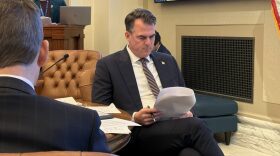With a huge freshman class and a promise for less gridlock, Oklahoma lawmakers filed more than 2,800 bills this legislative session. With a third of the session now over, the StateImpact team has an update on some bills we’re following.
Health
After facing criticism by anti-abortion groups, Senate Pro Tempore Greg Treat threw out the so-called ‘trigger’ language in Senate Bill 195. The language said if abortion is outlawed on a federal level, either by overturning Roe v. Wade or by a U.S. constitutional amendment, the bill would then immediately do away with the state’s current regulations, and make abortion a felony in Oklahoma.
Instead, the new language passed March 14 in the state Senate goes further and asks voters to add a constitutional amendment explicitly stating that receiving or performing an abortion is not protected by the Oklahoma Constitution. The proposal was backed by nearly all Senate Republicans.
The bill now heads to the House. If approved, the soonest it could go on the ballot would be 2020.
In a press release from his office, Treat said he expects to pursue the “trigger” language in another bill at some point in the future.
There’s also Senate Bill 614, authored by Republican Senator Julie Daniels. It would require doctors to tell women undergoing medication abortions that the procedure can be reversed after the first drug is taken but before the second, and would fine a clinic $10,000 per day if they don’t make information available. Opponents say that it would intrude into doctor-patient relationships and promote a medically unproven reversal procedure.
Medication abortions are considered safe and highly effective, according to the Kaiser Family Foundation, a nonpartisan health information, and policy group. They are usually offered to patients early in a pregnancy, using two different medications: Mifepristone, sold under the brand name Mifeprex, and Misoprostol. Mifepristone blocks progesterone, a hormone essential to the development of a pregnancy, and Misoprostol, taken 24-48 hours later, causes the uterus to expel its contents, according to the foundation.
Oklahoma currently has some of the strictest abortion laws in the nation. A woman must receive state-directed counseling that includes information designed to discourage her from having an abortion, and then wait 72 hours before the procedure is provided. By law, abortions aren’t covered under most health insurance policies.
Senate Bill 605 is flying under the radar. It’s a Medicaid expansion bill – sort of. The bill directs the Oklahoma Health Care Authority to create an “Oklahoma Plan” within the state’s Affordable Care Act marketplace. Residents making up to 138 percent of the federal poverty level would be able to purchase these subsidized, private plans.
If passed, Oklahoma will ask the federal government if the state can use Medicaid expansion dollars for the plan. It’s similar to Arkansas’ Medicaid expansion, but the big difference is that Oklahoma’s plan includes work requirements. Lawmakers would likely include cutting coverage for members of the expansion population who don’t meet a work reporting requirement in any expansion plan.
Oklahoma has the second highest uninsured rate in the nation, and proponents of SB 605 say it would expand access to about 100,000 people and would cost the state an estimated $148 million dollars to implement. But, the title has been stricken from this bill, meaning its introductory definition has been removed. The procedural move means lawmakers could radically change it and rewrite the bill’s description before it gets final approval.
Finally, one bill we’ve been watching has already passed both chambers and been signed into law. House Bill 2612, more commonly referred to as the ‘unity bill’ would create a regulatory framework for Oklahoma’s medical marijuana industry. The 77-page bill is largely the product of a bicameral Medical Marijuana Working Group, which met numerous times last fall and drafted regulatory language to fill in the gaps left by State Question 788, a voter-approved ballot initiative that legalized medical marijuana last June after the legislature had adjourned.
The legislation includes detailed testing, licensing, inspection and penalty requirements for medical marijuana. The bill has come under fire by medical marijuana industry advocates, who say that it puts too much regulatory power ultimately in the hands of the Oklahoma State Department of Health, the umbrella agency over the Oklahoma Medical Marijuana Authority.
The bill was signed into law by Governor Kevin Stitt on March 14, 2019.
Criminal Justice
On the criminal justice front, four bills could have a significant effect on Oklahoma’s justice system.
House Bill 1269 has gotten the most notoriety. It would apply sentencing reforms inside State Question 780 to state prisoners who were convicted before the law changed.
State Question 780 made drug possession a misdemeanor and raised the felony threshold for many property crimes to $1,000. Oklahoma County’s head public defender, Bob Ravitz, said the bill would significantly reduce the state’s prison population.
“It’ll free up individuals who have minor felony convictions and allow them to become productive members of the workforce again,” Ravitz said.
Department of Corrections data from late January suggested at least 2,000 people could get shorter sentences under that bill if it were enacted immediately. But the measure faces some resistance from the state’s district attorneys who say not all of the people who would be affected should get shorter sentences.
There are multiple other bills that have gotten less public attention and are part of a movement for criminal justice reform in Oklahoma. Reform advocates and state officials hope to get rid of Oklahoma’s status as the state with the highest incarceration rate.
- HB 2009 would reduce the length of sentences for people who are convicted after a previous felony conviction.
- HB 1100 would set guidelines for courts to easily separate simple drug possession cases from drug possession with the intent to distribute.
- SB 252 would allow more people to be released from jail before their trial date.
SB 967 and SB 975 would create rules for how police should track and handle rape kits.
Education
It has been nearly one year since Oklahoma teachers walked out of the classroom demanding more funding for public schools, and education remains a top issue at the state capitol.
House Bill 1780, a bill that would give teachers an additional $1,200 raise, is still in play. Combined with the pay raise passed just before the 2018 teacher walkout, it would bring the state’s average teacher salary to number one in the region. Some educators, however, say they would rather see those dollars injected into the classroom.
Education funding could become a sticking point during the budgeting process.
Lawmakers have about $575 million extra to appropriate this session, but Republican priorities could cut that figure in half. In his executive budget, Gov. Stitt estimated raising teacher pay again will cost close to $70 million, and another $230 million must go toward existing obligations, like debt. Plus, adding money to the state’s savings account is also important to Republicans.
However, The Oklahoma Education Association, which led last year’s walkout, supports additional raises, but the organization has also requested $150 million more for education in the fiscal year 2020.
Here are a few other education bills to follow:
Restoring the Five Day School Week: Senate Bill 441, authored by Republican Sen. Marty Quinn would effectively force school districts operating four days a week to return to a five-day school week. Schools can request exemptions, but the bar is high. Districts would have to show student performance met or exceeded statewide averages, as well as cost savings, under a four-day schedule.
Republicans who support the measure say it will make Oklahoma more attractive to businesses.
Preschool and Kindergarten Cutoffs: A bill that would raise the age for enrolling in kindergarten and preschool is also still in the running to become law. Currently, Oklahoma preschoolers must turn four years old and kindergartners must turn five before September 1. Senate Bill 1020 by Republican Sen. Greg McCortney, moves the date to Aug. 1, meaning more kids would have to wait a year to enroll.
Critics say the measure could negatively impact low-income children, but McCortney has referenced data from the Oklahoma State Department of Education showing roughly 40 percent of children who had to repeat pre-K in the last five years were born in July or August.
Tweaking School Funding: School funding is based partly on the number of students districts serves, but some students count for more than one— they’re weighted. Republican Sen. Gary Stanislawski authored Senate Bill 362 after leading a task force that recommended adjusting weights for some disadvantaged students. For example, Stanislawski’s bill increases the weight for low-income students from 1.25 to 1.3, but that’s less than what task force recommended.
“The reason we had to go with just .05 increase is over half of the children in the state are economically disadvantaged,” Stanislawski explained.
The changes depend on an infusion of $60 million into the state funding formula. The cost of implementing the adjustments recommended by the task force, according to Stanislawski, is $800 million. The bill also attempts to distinguish bilingual students from those who lack English proficiency.
Virtual Charter Schools: Oklahoma lawmakers have advanced legislation designed to increase transparency for the virtual charter school system. Authored by Republican Rep. Sheila Dills, House Bill 1395 says virtual charters are subject to the same financial reporting as other public schools.
“We’re just trying to add clarity to the Virtual Charter School Act of 2012,” Dills said Wednesday. “Some of the virtual charter schools have made significant efforts to be more transparent than others.”
The legislation also requires owners of the private companies that manage virtual charter schools and board members to disclose conflicts of interest with companies the school’s contract with. It comes as Epic Charter Schools, the largest in the state, faces investigations by state and federal law enforcement.
StateImpact Oklahoma is a partnership among Oklahoma’s public radio stations and relies on contributions from readers and listeners to fulfill its mission of public service to Oklahoma and beyond. Donate online.
As a community-supported news organization, KGOU relies on contributions from readers and listeners to fulfill its mission of public service to Oklahoma and beyond. Donate online, or by contacting our Membership department.










